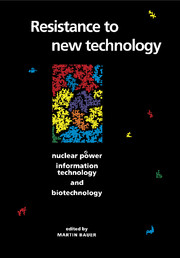Book contents
- Frontmatter
- Contents
- Contributors
- Preface
- 1 Resistance to new technology and its effects on nuclear power, information technology and biotechnology
- PART I Conceptual issues
- PART II Case studies
- 6 Patterns of resistance to new technologies in Scandinavia: an historical perspective
- 7 Henry Ford's relationship to ‘Fordism’: ambiguity as a modality of technological resistance
- 8 Resistance to nuclear technology: optimists, opportunists and opposition in Australian nuclear history
- 9 New technology in Fleet Street, 1975–80
- 10 The impact of resistance to biotechnology in Switzerland: a sociological view of the recent referendum
- PART III International comparisons
- PART IV Comparisons of different technologies
- PART V Afterword
- Index
10 - The impact of resistance to biotechnology in Switzerland: a sociological view of the recent referendum
Published online by Cambridge University Press: 06 July 2010
- Frontmatter
- Contents
- Contributors
- Preface
- 1 Resistance to new technology and its effects on nuclear power, information technology and biotechnology
- PART I Conceptual issues
- PART II Case studies
- 6 Patterns of resistance to new technologies in Scandinavia: an historical perspective
- 7 Henry Ford's relationship to ‘Fordism’: ambiguity as a modality of technological resistance
- 8 Resistance to nuclear technology: optimists, opportunists and opposition in Australian nuclear history
- 9 New technology in Fleet Street, 1975–80
- 10 The impact of resistance to biotechnology in Switzerland: a sociological view of the recent referendum
- PART III International comparisons
- PART IV Comparisons of different technologies
- PART V Afterword
- Index
Summary
Switzerland is an excellent case for studying public debates about new technology. The Swiss political institutions of direct democracy enable citizens to set substantive issues regarding new technologies on the public agenda and to subject them to a popular vote (Frey & Bohnet 1993). Given modern society's great functional differentiation and distinct relative autonomy of its various subsystems (see Touraine, Chapter 2), the institutions of the initiative and the referendum provide a means for securing citizens' direct access to the political arena and for voicing their concerns about social, political, cultural and technological developments. The public discourse engendered by initiatives and referenda not only raises citizens' consciousness about the issues in question, but also assumes a monitoring function regarding the relatively autonomous activities pursued in society's various subsystems (see Bauer, Chapter 19). In this respect, initiatives and referenda concerning scientific and technological issues may be regarded as highly constructive forms of public resistance to scientific and technological developments because they stimulate debates in the public arena about the issues in question, enable citizens to state their preferences, and thus bind scientific–technological activity into democratic procedures. The concerns raised by public debates about scientific–technological developments may be interpreted as signals to the respective institutions to reconsider and re-evaluate their activities. These particular forms of public resistance to new technologies may result in significant adaptations of scientific–technological endeavours to address public concerns.
- Type
- Chapter
- Information
- Resistance to New TechnologyNuclear Power, Information Technology and Biotechnology, pp. 207 - 224Publisher: Cambridge University PressPrint publication year: 1995
- 5
- Cited by



